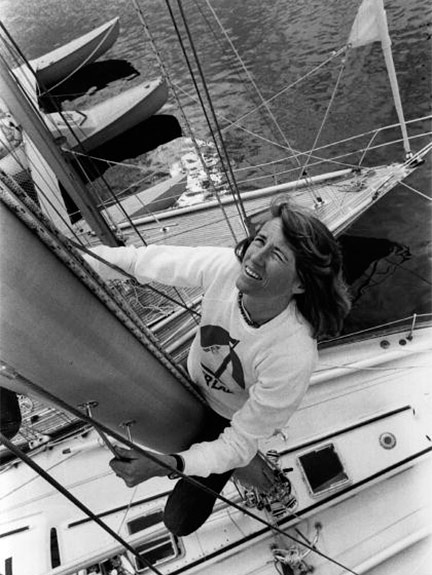Were there a Hall of Fame of Sleep Deprivation, a special place would be reserved for single-handed sailors who routinely rise from their bunks to check their rigs and scan the horizon for oncoming vessels. It’s a reasonable safety precaution. It also invites its own measure of risk by compromising reaction times, hand-eye coordination, and general judgment, the kind of things scientists study at WSU Spokane’s Sleep and Performance Research Center.

As it happens, Lois James MA ’09, PhD ’11, a research assistant professor in the center, is the daughter of Naomi James, the first woman to sail single-handed around the world via the treacherous Cape Horn.
James took 272 days to complete her 1977-1978 voyage, beating the record of Sir Francis Chichester by two days. She sailed a 53-foot sloop that ordinarily had a crew of ten.
Reached at her home in southern Ireland with Lois’s help, James says she initially slept only 20 minutes at a time while in the traffic lanes of the North Atlantic. At times, she says, she went 48 hours without any sleep at all, like the time she sailed through a gale on her approach to the Cape. Most sailors come within sight of the coast, but she feared the wind might shift and put her on the rocks, so she put her self-steering gear on a southerly course. Then she went to sleep for six hours.
She sailed deep into the iceberg zone of the Southern Ocean. “There was a very good chance that there were icebergs around,” she says. “I knew that theoretically, but this is a funny thing about priorities. I suppose maybe it’s fatalism, maybe it’s trusting to luck or something of that kind, but I just knew that I had to sleep. So I went to sleep.”
When she awoke, James turned north, cleared the Cape, and pulled into the Falkland Islands, where an ice patrol vessel told her she had been sailing in the vicinity of an iceberg 20 or 30 miles long. “When I think about it now, it’s a funny thing how one equates danger or risk when you’re very sleep-deprived like that,” she says. “The normal standards that you have when you’re properly functioning, they go by the board and you take much greater risks.”
Read more about sleep science in “If You Don’t Snooze, You Lose”
Video
Deadly Force and Fatigue: Studying the effects of exhaustion on police officers
